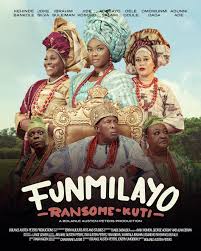
Funmilayo Ransome-Kuti is a remarkable Nollywood biopic directed by Bolanle Austen-Peters. The film honors the life and legacy of Funmilayo Ransome-Kuti, a trailblazing Nigerian educator, feminist, and political activist often referred to as “The Lioness of Lisabi.”
Plot Overview
The movie chronicles key moments in Funmilayo’s life, capturing her unyielding advocacy for women’s rights and her pivotal role in Nigeria’s socio-political landscape. From her revolutionary leadership in the Abeokuta Women’s Union (AWU) to her defiant protests against unfair taxation policies imposed on women in the 1940s, Funmilayo’s story is one of resilience and courage. Her relentless activism led to groundbreaking reforms, including the historic abdication of the Alake of Egba Land, a powerful traditional ruler.
The film also highlights her personal life, shedding light on her upbringing, her pursuit of education in an era when women’s schooling was undervalued, and her contributions to the global feminist movement. In addition, the narrative offers an intimate portrayal of her role as the mother of Fela Kuti, the legendary Afrobeat pioneer, showcasing the intersection of her influence on both her family and her nation.
Themes
Gender Equality and Activism: Funmilayo’s fight for women’s rights and her efforts to dismantle societal barriers take center stage.
Colonial Resistance: The film explores her opposition to colonial oppression and exploitation, emphasizing her role as a nationalist.
Legacy and Influence: By weaving in her personal and family life, the story underscores her lasting impact on Nigerian history and culture.
Cast and Performances
Kehinde Bankole delivers a powerhouse performance as Funmilayo, embodying her strength, intelligence, and compassion.
Joke Silva portrays Funmilayo’s mother with grace, offering insights into the family dynamics that shaped her early life.
Ibrahim Suleiman plays pivotal roles that complement Funmilayo’s journey, including interactions with political allies and opponents.
Production Quality
Directed by Bolanle Austen-Peters, the film is celebrated for its meticulous attention to historical accuracy. The production design vividly recreates mid-20th century Nigeria, complete with authentic costumes and settings that transport viewers to the era. The screenplay deftly balances political drama with emotional depth, ensuring the story remains engaging and accessible.
The cinematography and score are equally praiseworthy, enhancing the film’s emotional and historical resonance. The inclusion of traditional Yoruba music and chants adds cultural depth, while subtle nods to Afrobeat pay homage to Funmilayo’s influence on her son’s artistic legacy.
Reception
Funmilayo Ransome-Kuti has been widely acclaimed for its compelling storytelling and strong performances. Critics have lauded its ability to educate and inspire, while audiences appreciate its celebration of a pivotal figure in Nigerian history. The film has sparked renewed interest in Funmilayo’s life, with many commending its role in preserving and promoting African heritage.
Cultural and Historical Impact
The movie is not just a biopic but a powerful reminder of the struggles and triumphs of women who paved the way for gender equality in Nigeria. It serves as a testament to Funmilayo’s enduring legacy and her influence on future generations of feminists, activists, and leaders.
Funmilayo Ransome-Kuti stands as a milestone in Nollywood’s evolution, combining historical significance with world-class storytelling to deliver a film that is both educational and deeply moving.


